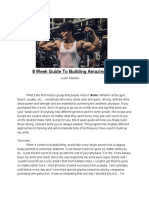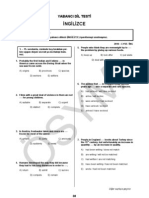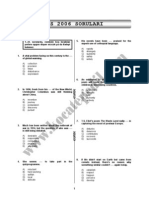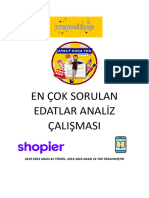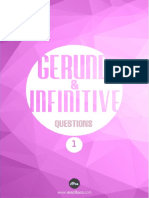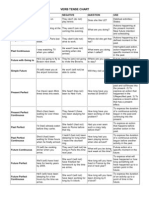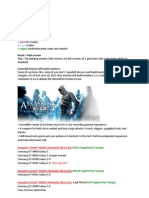Tenses in English - Ingilizce'De Tüm Zamanlarin Özeti (Tablo)
Tenses in English - Ingilizce'De Tüm Zamanlarin Özeti (Tablo)
Uploaded by
kvardar35Copyright:
Available Formats
Tenses in English - Ingilizce'De Tüm Zamanlarin Özeti (Tablo)
Tenses in English - Ingilizce'De Tüm Zamanlarin Özeti (Tablo)
Uploaded by
kvardar35Original Title
Copyright
Available Formats
Share this document
Did you find this document useful?
Is this content inappropriate?
Copyright:
Available Formats
Tenses in English - Ingilizce'De Tüm Zamanlarin Özeti (Tablo)
Tenses in English - Ingilizce'De Tüm Zamanlarin Özeti (Tablo)
Uploaded by
kvardar35Copyright:
Available Formats
TENSES IN ENGLISH - INGILIZCE'DE TM ZAMANLARIN ZET (TABLO) Tense The Simple Present Tense The Simple Past Tense
Future Tense The Present Continuous Tense The Past Continuous Tense The Future Continuous Tense Future Going to Positive I go to cinema on Fridays. We took an exam last week. He will visit Topkapi Palace next week. I'm studying English now. He was reading a novel when I came to the house. Negative I do not like playing basketball. He did not come to school yesterday. I will not come to the meeting next week. It is not snowing outside now. It was not raining when we arrived at home. Question Do you know me? Did you take an exam yesterday? Will you come to Turkey this year? Why are you doing that? What was he doing when we were not at home.
She will be I will not be living in What will you be sleeping when you Ankara this time next doing this time next arrive at home. year. year? He is going to visit his uncle in Canada next I'm not going to have Are you going to week. a holiday this summer. study it?
The Present Perfect Tense I have seen you two times this week.
I have not been to England.
How long have you been to Canada. Had you ever seen me before? How long will he have lived in London by the end of next spring? How long have you been studying English?
I had not finished my The Past Perfect I had already seen exam paper when the Tense that. bell rang. I will have She will not have graduated from finished her work by The Future university in two the time he comes Perfect Tense years. back. The Present I have been I have not been Perfect studying French watching TV for three Continuous for five hours. hours. Tense The Past Perfect Continuous Tense
He had been The party had been sleeping for hours going on for two hours How long had he when the doorbell when they began been sleeping when rang suddenly. quarrelling. we arrived?
The Future Perfect Continuous Tense
I will have been studying for two hours when you come back.
They will not have been watching TV for three hours by the time he goes out.
How long will you have been studying lesson by the time you take the examination?
Usage Bu tense ile genelde yaplan iler, alkanlklar ve bilimsel gereklikler ifade edilir. Gemite belirli bir zaman diliminde yaplan eylemleri anlatmak iin kullanlr. Gelecekle ilgili uan verilen kararlar ve tahminleri ifade ederken bu "tense" kullanlr. uan (iinde bulunduumuz anda) yapmakta olduumuz eylemleri anlatmak iin kullanlr. Bu "tense"i gemite belli bir noktada yapmakta olduumuz eylemleri anlatrken kullanrz. Gelecekte bir noktada yapyor olacanz eylemleri "Future Continuous" ile anlatrsnz. Gelecekle ilgili planlar bu "tense" ile ifade edilir. 1) Yakn gemite balayp sonular veya etkileri hala devam eden eylemler iin bu "tense" kullanlr. 2) Gemite gerekleen bir olay zaman vermeden ifade ediliyorsa yine bu "tense" kullanlr. Gemite bir eylemden daha nce gereklemi baka bir eylemden sz ediliyorsa "Past Perfect" kullanlr. Gelecekte bir noktada yapm veya tamamlam olacamz eylemler bu "tense" ile ifade edilebilir. Bu "tense" ile gemite balayp uan hala devam etmekte olan eylemler anlatlr. Gemite bir zaman diliminde balayp, yine gemite bir noktada biten eylemler bu "tense" ile ifade edilir.
Gelecekte bir eylemi ne kadar zamandr yapyor olacanz bu "tense" ile ifade edersiniz.
You might also like
- Justin MartiliniDocument17 pagesJustin MartiliniSanti SicaNo ratings yet
- Tense TabloDocument3 pagesTense TabloHosna SalehiNo ratings yet
- 12 The Ultimate Strategies For YDT Deniz Pınar PremiumDocument408 pages12 The Ultimate Strategies For YDT Deniz Pınar Premiummileymidnightsky29No ratings yet
- Cozumlu Yds SorulariDocument16 pagesCozumlu Yds Sorularionur samet özdemirNo ratings yet
- İngilizce: Yabanci Dil TestiDocument19 pagesİngilizce: Yabanci Dil TestiTuğba CanNo ratings yet
- 1 - Yds Gramer Konu Anlatimi Ve TestlerDocument219 pages1 - Yds Gramer Konu Anlatimi Ve TestlerZafer Altuncu100% (1)
- Vocabulary Game Bingo For Yks DilDocument3 pagesVocabulary Game Bingo For Yks DildemetsusNo ratings yet
- YDS Bilinmesi GerekenlerDocument16 pagesYDS Bilinmesi GerekenlerDr. Mustafa Yasin BaşçetinNo ratings yet
- AKIN DİL Prepositions-AdverbsDocument15 pagesAKIN DİL Prepositions-AdverbsSerpil AyNo ratings yet
- K4 English Ücretsiz DenemeDocument25 pagesK4 English Ücretsiz DenemeardaltinskNo ratings yet
- Yds 2006Document27 pagesYds 2006api-3771391100% (3)
- Lys 5 Ingilizce Deneme SinaviDocument12 pagesLys 5 Ingilizce Deneme SinaviaydnNo ratings yet
- Documents - Tips Ingilizce Passive Voice TablosuDocument1 pageDocuments - Tips Ingilizce Passive Voice TablosuBayram ÜstünNo ratings yet
- İngilizce Bütün Zamanlar TensesDocument10 pagesİngilizce Bütün Zamanlar Tensesİsmail ÇEVİKKILIÇNo ratings yet
- Can & Be Able To: If Yayinlari Grammar Pack - 2 - ModalsDocument12 pagesCan & Be Able To: If Yayinlari Grammar Pack - 2 - ModalsNovel Nt KafkaNo ratings yet
- AKIN Eğitim... Prepositions (80 Soru+Cevap)Document7 pagesAKIN Eğitim... Prepositions (80 Soru+Cevap)alpkreNo ratings yet
- Ydt Vocabulary & Grammar Test 5Document2 pagesYdt Vocabulary & Grammar Test 5umut koçNo ratings yet
- 12 Ydt Deneme 7Document21 pages12 Ydt Deneme 7sude nacarNo ratings yet
- Every/All/Whole + Zaman İfadeleri "All" Ve "Whole"Document2 pagesEvery/All/Whole + Zaman İfadeleri "All" Ve "Whole"Yasemin Kayaaltı DinçNo ratings yet
- Test Attack: MeaningDocument5 pagesTest Attack: MeaningVeyselNo ratings yet
- Modal Özeti: Konu I Billl' Y: YetenekDocument7 pagesModal Özeti: Konu I Billl' Y: YetenekmehmetNo ratings yet
- GrammerDocument2 pagesGrammerHotBros0% (1)
- Okuma Bulteni 6 CeviriDocument6 pagesOkuma Bulteni 6 Ceviriayşen_kaya_1No ratings yet
- YDS KPDS ÜDS ParagraflarDocument111 pagesYDS KPDS ÜDS Paragraflararamayapar100% (2)
- Bağlaç Soruları 1 PDFDocument8 pagesBağlaç Soruları 1 PDFRafet TanrıoğluNo ratings yet
- Yds Diyalog Tamamlama Sorulari Indir Coz 15243 PDFDocument15 pagesYds Diyalog Tamamlama Sorulari Indir Coz 15243 PDFibrahim Halil BiniciNo ratings yet
- YDS2 IngilizceDocument28 pagesYDS2 IngilizceMrtNo ratings yet
- Read For Speed 1 PDF 3Document11 pagesRead For Speed 1 PDF 3efendimtabj83No ratings yet
- Yds Soru Tipleri 170Document171 pagesYds Soru Tipleri 170ibrhm100% (1)
- Okuma Bulteni 8 CeviriDocument6 pagesOkuma Bulteni 8 Ceviriayşen_kaya_1No ratings yet
- Akın Tüm TR (1) - 51-125Document75 pagesAkın Tüm TR (1) - 51-125talhaaybat1No ratings yet
- Sadeleştirme Mantiği: Yds Kampi - İsmail TurasanDocument6 pagesSadeleştirme Mantiği: Yds Kampi - İsmail TurasanAlihan GökNo ratings yet
- Ydt Vocabulary & Grammar Test 4Document2 pagesYdt Vocabulary & Grammar Test 4umut koçNo ratings yet
- Deni̇z Pinar Yayincilik Ydt Deneme SinaviDocument20 pagesDeni̇z Pinar Yayincilik Ydt Deneme SinavionrcollectionNo ratings yet
- Basic Collection Ydt Deneme 1Document7 pagesBasic Collection Ydt Deneme 1Recep IşıkNo ratings yet
- Diyalog Sorulari 1Document12 pagesDiyalog Sorulari 1atalikaciNo ratings yet
- Yds RestatementsDocument10 pagesYds RestatementsbernagunduzNo ratings yet
- Tenses Konu AnlatimiDocument6 pagesTenses Konu Anlatimikl67% (3)
- Edatlar E-Ki̇tapDocument42 pagesEdatlar E-Ki̇taphsngrck59No ratings yet
- İngilizce Hikayeler Ve Türkçeleri Modül - 1Document13 pagesİngilizce Hikayeler Ve Türkçeleri Modül - 1Omer DirikNo ratings yet
- Deneme: 2021 - 2022 Eğitim Ve Öğretim Yili Yabanci Dil TestiDocument27 pagesDeneme: 2021 - 2022 Eğitim Ve Öğretim Yili Yabanci Dil TestiMel DiopNo ratings yet
- YDS Eş Anlamlı Cümle Soru TipiDocument11 pagesYDS Eş Anlamlı Cümle Soru TipiAhmet GürkanNo ratings yet
- Passagework YDS Ön Hazırlık Seviye 1 Ornek ParcaDocument18 pagesPassagework YDS Ön Hazırlık Seviye 1 Ornek Parcanuray mercanNo ratings yet
- YDS +20 Puan Hap Kaynak Serisi Test 1 Soru 1Document10 pagesYDS +20 Puan Hap Kaynak Serisi Test 1 Soru 1yaseminbalimNo ratings yet
- Basic Gramer & Test Book - (Starter) - MDocument184 pagesBasic Gramer & Test Book - (Starter) - MTuba KaanNo ratings yet
- Arastirma Incleme Cumle Ici Kelime Test Tum Akin DilDocument4 pagesArastirma Incleme Cumle Ici Kelime Test Tum Akin DilYalçın - AYGÜN100% (1)
- Passagework YDS Ön Hazırlık Seviye 2 Ornek ParcaDocument5 pagesPassagework YDS Ön Hazırlık Seviye 2 Ornek ParcaSalih BalcıNo ratings yet
- YDS Deneme Sinavi - 5Document16 pagesYDS Deneme Sinavi - 5Yasar YasarlarNo ratings yet
- Ydt Vocabulary & Grammar Test 2Document3 pagesYdt Vocabulary & Grammar Test 2umut koçNo ratings yet
- Tense Hap Bi̇lgi̇lerDocument12 pagesTense Hap Bi̇lgi̇lerAbdussamed YıldızNo ratings yet
- Gerund & Infinitive SorularıDocument6 pagesGerund & Infinitive SorularıNovel Nt KafkaNo ratings yet
- 2021 2022 Turkiye Geneli Ydt Deneme Sinavi IDocument24 pages2021 2022 Turkiye Geneli Ydt Deneme Sinavi IUmut ÇağlayantaşNo ratings yet
- İngilizce ZamanlarDocument3 pagesİngilizce ZamanlarkgkurtarNo ratings yet
- Unit 3 Grammar: Present Perfect TenseDocument38 pagesUnit 3 Grammar: Present Perfect TenseGlayberson Pereira100% (1)
- Present Perfect Simple ContinuousDocument17 pagesPresent Perfect Simple ContinuousLiliana RaduNo ratings yet
- Unit 1 Tense ReviewDocument7 pagesUnit 1 Tense Reviewnatgrita18No ratings yet
- Verb Tense ChartDocument1 pageVerb Tense ChartAndre OliveiraNo ratings yet
- Verb Tense ChartDocument2 pagesVerb Tense ChartGon Flo100% (1)
- Indefinite Tenses (Examples)Document9 pagesIndefinite Tenses (Examples)statsenkoNo ratings yet
- Examples: You Speak English. You Do Not Speak EnglishDocument7 pagesExamples: You Speak English. You Do Not Speak EnglishElizabeth KarinaNo ratings yet
- Examples: You Speak English. You Do Not Speak EnglishDocument7 pagesExamples: You Speak English. You Do Not Speak EnglishElizabeth KarinaNo ratings yet
- An 1 2023Document9 pagesAn 1 2023BrevEliuneANo ratings yet
- Timeline EventsDocument11 pagesTimeline EventsHnut hinorNo ratings yet
- Nike-A Case Study: NikewDocument17 pagesNike-A Case Study: Nikewsadear arhhhNo ratings yet
- GRADE 7-10 TLE EclassDocument55 pagesGRADE 7-10 TLE EclassVincent LibreaNo ratings yet
- Storytellers Handbook, Revised (2002)Document216 pagesStorytellers Handbook, Revised (2002)Bruno MachadoNo ratings yet
- Success - Top 400 Movie QuotesDocument103 pagesSuccess - Top 400 Movie QuotesGeorge PruteanuNo ratings yet
- Diagrama de Faros y LamparasDocument6 pagesDiagrama de Faros y LamparasJ. Carlos GtzNo ratings yet
- Candy Girl": Amigurumi Crochet Pattern Amalou - DesignsDocument6 pagesCandy Girl": Amigurumi Crochet Pattern Amalou - DesignsTanja Martinovic100% (2)
- Gaur SoundryamDocument40 pagesGaur SoundryamphotographylobbNo ratings yet
- Komatsu Parts PDFDocument5 pagesKomatsu Parts PDFkamilNo ratings yet
- Material Downloaded From - 1 / 6Document6 pagesMaterial Downloaded From - 1 / 6karanveerNo ratings yet
- Bata Kenya Industrials CatalogueDocument14 pagesBata Kenya Industrials CatalogueBataKenyaNo ratings yet
- Lexam 945712Document61 pagesLexam 945712laode ramadhanNo ratings yet
- Men's Health Australia 10-2019Document132 pagesMen's Health Australia 10-2019ΑΡΙΣΤΟΤΕΛΗΣ ΓΕΩΡΓΟΠΟΥΛΟΣ100% (5)
- Transformer: 5 AmpsDocument7 pagesTransformer: 5 Ampsmohammad ghassanNo ratings yet
- Weight Bench Exerciser User's Manual: CautionDocument24 pagesWeight Bench Exerciser User's Manual: CautionmehralsmenschNo ratings yet
- History of Taekwondo in MalaysiaDocument17 pagesHistory of Taekwondo in Malaysiaiffah16100% (1)
- Prana Pranayama Prana VidyaDocument184 pagesPrana Pranayama Prana Vidyawonderannmecom98% (46)
- Assassin's Creed™ Altaïr's Chronicles HDDocument3 pagesAssassin's Creed™ Altaïr's Chronicles HDalex_hantaNo ratings yet
- Denso CR HP3 Nissan-Pathfinder YD2k2Document11 pagesDenso CR HP3 Nissan-Pathfinder YD2k2james santiago100% (3)
- Product Mix of Adidas-1Document19 pagesProduct Mix of Adidas-1SHAGUN BADYALNo ratings yet
- ChangelogDocument69 pagesChangelogSantiago KokiriNo ratings yet
- Wayne Tinkle Oregon State Contract and AmendmentsDocument29 pagesWayne Tinkle Oregon State Contract and AmendmentsMatt BrownNo ratings yet
- Graceland Too ChordsDocument1 pageGraceland Too ChordsMartin GreenbergNo ratings yet
- Freewheel InterchangeDocument14 pagesFreewheel InterchangeMaksim MelnikovNo ratings yet
- CAT 3516B Parts CatalogueDocument209 pagesCAT 3516B Parts CatalogueSergei Kurpish100% (19)
- F1 in SchoolsDocument7 pagesF1 in SchoolsFrankNo ratings yet
- Find Your Car's Date of Manufacture (VIN) - Team-BHPDocument13 pagesFind Your Car's Date of Manufacture (VIN) - Team-BHPPatrick OttoNo ratings yet
- Basic Skills For The InfernoDocument3 pagesBasic Skills For The InfernoAlan Ikrob JohnsonNo ratings yet
